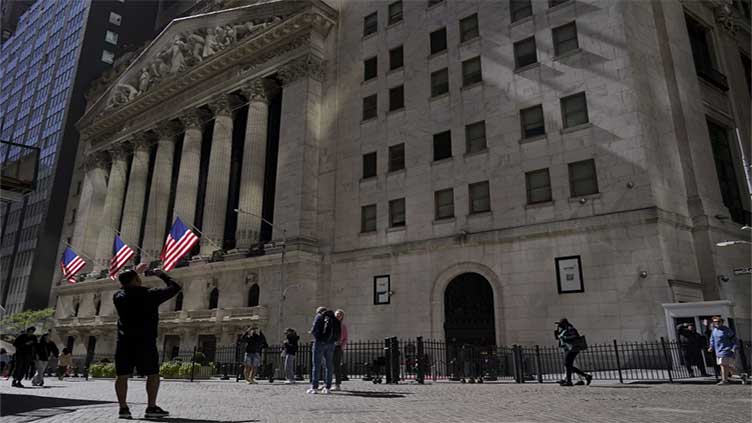Asian shares mostly sank Tuesday over worries about a possible U.S. government shutdown and the troubled Chinese economy.
Japan’s benchmark Nikkei 225 index slipped 0.6% in morning trading to 32,469.85. Australia’s S&P/ASX 200 dipped 0.5% to 7,042.50. South Korea’s Kospi dropped nearly 1.0% to 2,471.30. Hong Kong’s Hang Seng shed 0.9% to 17,578.90, while the Shanghai Composite fell 0.2% to 3,110.86.
Investors are watching for Chinese economic indicators being released later in the week.
“The Chinese property woes are far from over, as the notorious developer Evergrande defaulted on its 4 billion yuan onshore bond repayment and delayed the restructuring meetings,” said Tina Teng, market analyst at CMC Markets APAC & Canada.
Wall Street clawed back some of its steep losses from last week. The S&P 500 rose 17.38, or 0.4%, to 4,337.44, coming off its worst week in six months. The Dow Jones Industrial Average edged up 43.04, or 0.1%, to 34,006.88, and the Nasdaq composite gained 59.51, or 0.5%, to 13,271.32.
Realization is sinking in that the Federal Reserve will likely keep interest rates high well into next year. The Fed is trying to ensure high inflation gets back down to its target, and it said last week it will likely cut interest rates in 2024 by less than earlier expected. Its main interest rate is at its highest level since 2001.
The growing understanding that rates will stay higher for longer has pushed yields in the bond market up to their highest levels in more than a decade. That in turn makes investors less willing to pay high prices for all kinds of investments, particularly those seen as the most expensive or making their owners wait the longest for big growth.
The yield on the 10-year Treasury rose to 4.53% from 4.44% late Friday and is near its highest level since 2007. That’s up sharply from about 3.50% in May and from 0.50% about three years ago.
“Stocks digest gradual, growth driven increases in interest rates far better than rapid increases driven by other factors such as inflation or Fed policy,” Goldman Sachs strategists led by David Kostin wrote in a report.
Higher yields are at the head of a long line of concerns weighing on Wall Street. Not only have oil prices jumped by $20 per barrel since June, economies around the world are looking shaky. The resumption of U.S. student-loan repayments may also weaken what’s been the U.S. economy’s greatest strength, spending by households.
In the near term, the U.S. government may be set for another shutdown amid more political squabbles on Capitol Hill. But Wall Street has managed its way through previous shutdowns, and “history shows that past ones haven’t had much of an impact on the market,” according to Chris Larkin, managing director of trading and investing at E-Trade from Morgan Stanley.
On Wall Street, Amazon rose 1.7% and was the strongest single force pushing up on the S&P 500. The company announced an investment of up to $4 billion in Anthropic, as it takes a minority stake in the artificial intelligence startup. It’s the latest Big Tech company to pour money into AI in the race to profit from opportunities that the latest generation of the technology is set to fuel.
Stocks of media and entertainment companies were mixed after unionized screenwriters reached a tentative deal on Sunday to end their historic strike. No deal yet exists for striking actors.
Netflix rose 1.3%, while The Walt Disney Co. slipped 0.3%. Warner Brothers Discovery dropped 4% for the day’s largest loss in the S&P 500.
Also on the losing end of Wall Street were stocks of travel-related companies, which slumped under the weight of worries about higher fuel costs. Southwest Airlines sank 2% and Norwegian Cruise Line fell 3.1%.
In energy trading, benchmark U.S. crude slipped 7 cents to $89.61 a barrel. Brent crude, the international standard, fell 14 cents to $93.15 a barrel. On Wall Street, Exxon Mobil rose 1.1% and ConocoPhillips gained 1.6%. Oil prices have leaped sharply since the early summer.
In currency trading, the U.S. dollar rose to 148.93 Japanese yen from 148.84 yen. The euro cost $1.0586, down from $1.0594.
Post Views: 63


 Sports3 months ago
Sports3 months ago
 Sports3 months ago
Sports3 months ago
 Fashion3 months ago
Fashion3 months ago
 World3 months ago
World3 months ago
 World3 months ago
World3 months ago
 Sports2 months ago
Sports2 months ago
 Sports2 months ago
Sports2 months ago
 World3 months ago
World3 months ago



















